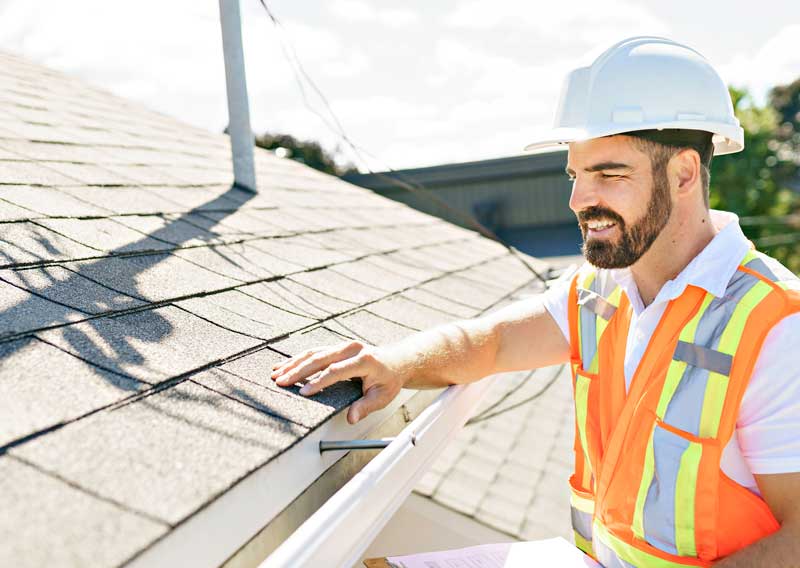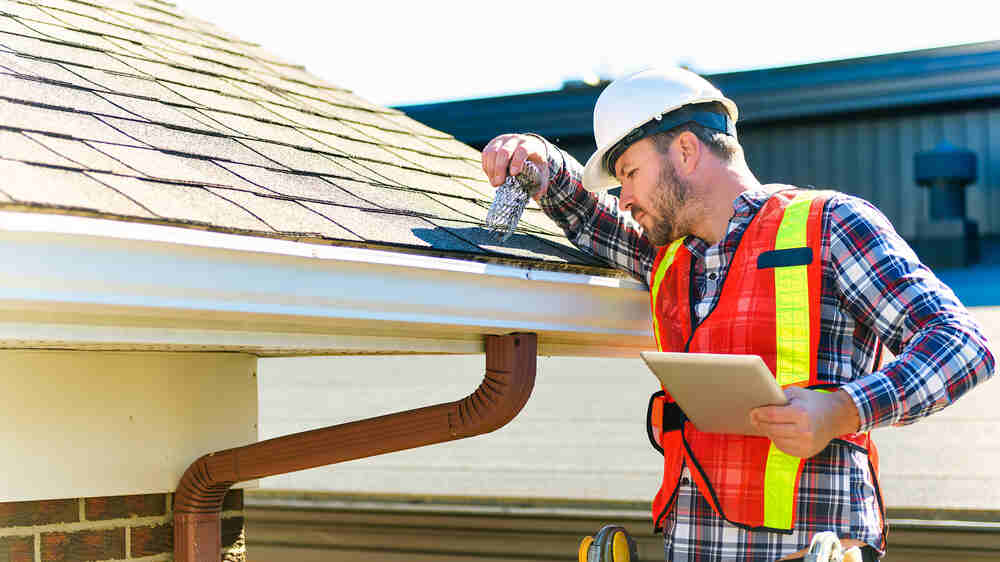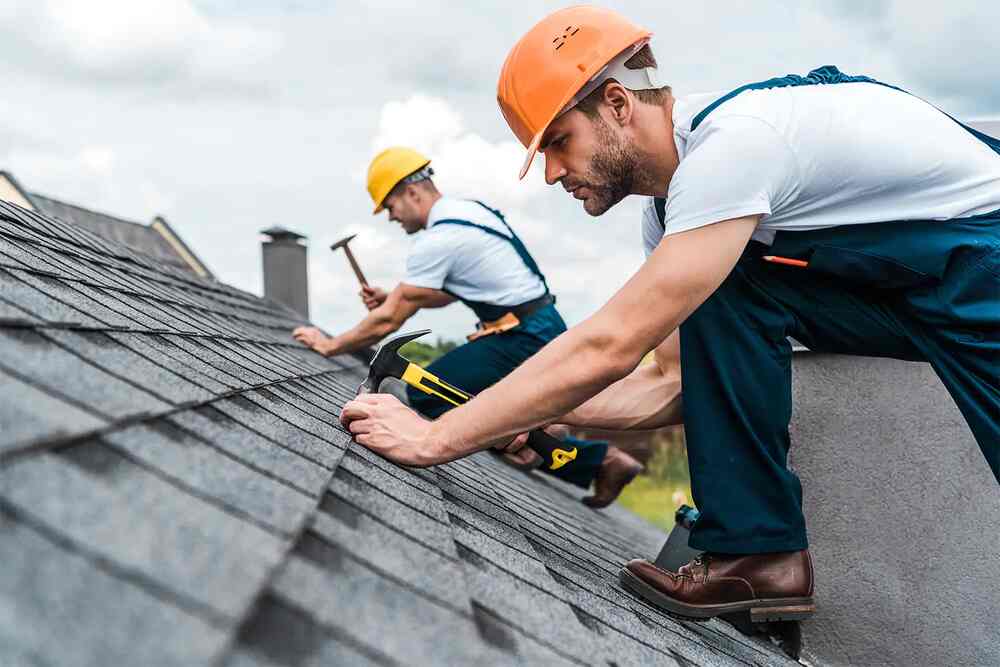Buying a home is a major investment, and while factors like location, layout, and price are top priorities, one crucial element buyers often overlook is the roof. A professional roof inspection can uncover hidden damage, structural weaknesses, or potential repair costs that could impact your decision—or your budget—after the purchase. Ignoring this step could lead to costly surprises, from leaks and water damage to full roof replacements.
Before you finalize your home purchase, here’s why a roof inspection is a must and how it can save you money and stress in the long run.
Table of Contents
Key Takeaways✔ A roof inspection prevents unexpected repair costs by identifying potential damage before purchase, ensuring buyers make a sound financial decision. ✔ Many roofing problems, like leaks, mold, or structural weaknesses, aren’t visible from the ground, making a professional inspection essential. ✔ Inspection findings allow buyers to negotiate repairs, request a price reduction, or secure a home warranty to offset future expenses. ✔ Home insurance providers may deny coverage or charge higher premiums if a roof is too old or in poor condition, making an inspection crucial for policy approval. |

Why a Roof Inspection Matters When Buying a Home
A home’s roof is its first line of defense against the elements, shielding the structure from rain, wind, snow, and extreme temperatures. Without proper upkeep, an aging or damaged roof can lead to costly repairs, reduced energy efficiency, and even compromised structural integrity. A professional roof inspection ensures the roof is in optimal condition before purchasing a home, allowing buyers to make informed decisions and avoid unexpected expenses.
Protecting the Investment
Purchasing a home is a significant financial commitment, and failing to assess the condition of its roof can lead to expensive surprises down the line. A failing roof can result in water leaks, insulation damage, and even foundation issues if left unaddressed. The cost of roof repair services can range from minor fixes to a full roof replacement, which can be one of the most expensive home repairs. By investing in a roof inspection, buyers gain a clear understanding of the roof’s lifespan and any immediate maintenance needs, helping them make a sound financial decision.
Additionally, a roof in poor condition can lower the overall value of a property. If the roof requires major roof repairs, the home may not appraise as high as expected, affecting mortgage approvals and financing. A well-maintained roof, on the other hand, adds to a home’s market value and enhances curb appeal.
Identifying Hidden Issues
A roof may look structurally sound from a distance, but underlying issues often go undetected without a thorough roof inspection. During a home inspection, a certified inspector examines different components of a property to determine its condition and uncover potential problems. It is common for inspectors to identify defects, ranging from minor issues to major concerns, with reports indicating that 86% of home inspections reveal necessary repairs. Common hidden problems include:
- Damaged or deteriorating shingles – Cracks, curling, or missing shingles can indicate aging or storm damage, which can compromise the roof’s ability to prevent leaks.
- Worn-out flashing and sealants – Flashing protects vulnerable areas, such as chimneys, vents, and skylights. If it is loose or damaged, water can seep into the home, leading to rot and mold growth.
- Sagging or weakened roof structure – Structural problems, such as a sagging roof, can indicate excessive weight from past snowfall, weakened framing, or rotting support beams.
- Moisture retention and mold – Poor drainage or insulation issues can trap moisture under roofing materials, leading to mold growth and deteriorating wood structures.
Negotiating Repairs or Price Adjustments
A roof inspection provides valuable leverage when negotiating a home purchase. Without an inspection, buyers may inherit roofing problems that result in out-of-pocket expenses soon after purchasing the home. Negotiating based on inspection findings ensures that buyers do not pay more than the home’s true value. If issues are discovered, buyers have several options:
- Request the seller to make the necessary roof repairs before closing. This ensures the home is move-in ready without additional roof repair services costs.
- Negotiate a lower sale price to offset anticipated roof maintenance and repair costs. Buyers can use the inspection report to justify their request.
- Ask for a home warranty that covers roofing issues. This ensures some financial protection in case of future roof repair needs.
Ensuring Home Insurance Eligibility
Home insurance providers assess the condition of a home’s roof before offering coverage. If an insurer deems the roof too old or in poor condition, the buyer may struggle to secure a policy or face high premiums. Some key insurance considerations include:
- Roof age and material – Many insurers are hesitant to cover roofs over 20 years old, particularly if they are made from less durable materials.
- Existing damage – If a roof inspection reveals leaks, missing shingles, or structural damage, an insurer may require repairs before issuing coverage.
- Storm and weather resistance – Some policies require roofs to meet local building codes for wind and storm resistance to minimize future claims.
What Does a Roof Inspection Include?
A roof inspection is a comprehensive assessment that ensures a home’s roof is structurally sound and capable of protecting the property from the elements. A professional inspector evaluates multiple aspects of the roof to detect potential weaknesses, prevent costly roof repair services, and determine whether a roof replacement may be necessary.
Shingles and Roofing Material
Shingles are the first line of defense against harsh weather conditions, and any signs of deterioration can indicate underlying issues. As of 2020, asphalt shingles made up around 64% of the residential roofing market, solidifying their position as the most widely used roofing material in North America. During a roof inspection, the inspector examines the condition of shingles or other roofing materials, checking for:
- Cracking, curling, or buckling – These issues typically occur due to prolonged exposure to the sun and fluctuating temperatures.
- Missing or loose shingles – Gaps in the roofing material can lead to leaks and reduce the roof’s ability to withstand heavy rain or wind.
- Granule loss – Asphalt shingles naturally shed granules over time, but excessive granule loss may indicate that a roof replacement is needed sooner rather than later.
- Punctures or impact damage – Hail, falling branches, or debris can create holes or weak spots that require immediate roof repair services.
Flashing and Sealants
Flashing and sealants are installed around chimneys, vents, skylights, and other roof penetrations to prevent water from seeping in. Even a small gap in the flashing can allow moisture to enter, leading to rot, mold, and structural damage. A professional roof inspection includes:
- Checking for rust or corrosion – Metal flashing can deteriorate over time due to exposure to rain and extreme temperatures.
- Inspecting for loose or missing flashing – Improper installation or wear can cause flashing to lift or separate from the roof.
- Evaluating the condition of sealants – Dried-out or cracked sealants can no longer effectively block water infiltration.
Gutters and Drainage
Proper water drainage is a crucial part of roof maintenance, as clogged or damaged gutters can lead to extensive roof and foundation problems. A roof inspection will assess the following:
- Debris buildup – Leaves, twigs, and dirt can accumulate in gutters, preventing water from draining properly and causing it to back up onto the roof.
- Signs of rust or corrosion – Older metal gutters may deteriorate, leading to leaks and potential damage to the fascia boards.
- Secure attachment to the home – Gutters should be firmly connected and not sagging, as loose gutters can allow water to seep behind them and damage the roofline.
- Proper downspout functionality – Downspouts must direct water away from the home’s foundation to prevent erosion or basement flooding.
Structural Integrity
A roof should be strong enough to withstand heavy loads, including accumulated snow, wind pressure, and other environmental stressors. The roof inspection includes a structural evaluation to identify:
- Sagging or uneven rooflines – This could indicate weakened roof decking, compromised rafters, or foundational issues.
- Soft spots on the roof – Walking on the roof should not feel spongy or weak; any flexing can suggest water damage or decay beneath the surface.
- Insufficient attic ventilation – Poor ventilation can cause heat and moisture buildup, leading to premature roofing material deterioration.
- Roof trusses and framing – The internal framework of the roof must be sturdy enough to support its weight and withstand external pressures.
Signs of Water Damage
One of the most critical aspects of a roof inspection is checking for water damage, as it can indicate long-term roof leaks or inadequate drainage. Water damage is one of the leading causes of costly roof replacement projects. Addressing small leaks early through roof repair services can prevent the need for extensive and expensive repairs later on. Inspectors look for:
- Water stains on ceilings or walls – These stains are a telltale sign of roof leaks that need immediate roof repair.
- Mold or mildew growth – Excess moisture due to leaks can lead to mold infestations, which can affect indoor air quality and pose health risks.
- Damp insulation – Insulation in the attic should be dry; dampness indicates a roof leak or poor ventilation.
- Rotting wood or compromised support structures – Water damage can weaken wooden beams and cause sections of the roof to deteriorate over time.
What Happens If Issues Are Found?
A roof inspection can reveal anything from minor wear and tear to significant structural problems. When issues are discovered, buyers must decide how to proceed based on the severity of the damage, the cost of necessary roof repair services, and their overall budget.
Request Repairs from the Seller
If the roof inspection uncovers damage such as missing shingles, leaks, or deteriorating flashing, buyers can request the seller to address the necessary roof repairs before closing. This is often the most favorable outcome, as it ensures the home is in good condition before the buyer assumes ownership. Common requests include:
- Replacing damaged or missing shingles – Ensuring the roof is weather-resistant and properly sealed.
- Repairing leaks and addressing water damage – Preventing further interior damage and mold growth.
- Fixing flashing and sealing problem areas – Stopping potential leaks around chimneys, vents, and skylights.
- Clearing and repairing gutters – Improving drainage and preventing water from pooling on the roof.
Negotiate a Price Reduction
If the seller is unwilling or unable to complete the required roof repairs, buyers can use the roof inspection report to negotiate a lower purchase price. A price adjustment can help buyers budget for future roof maintenance or a potential roof replacement. The extent of the price reduction depends on:
- The severity of the roof issues – Minor cosmetic damage may not warrant a significant reduction, but structural problems or major leaks could justify a substantial price cut.
- The estimated cost of repairs – Buyers can obtain quotes from reputable contractors to provide an accurate estimate of necessary roof repair services.
- Market conditions – In a buyer’s market, sellers may be more willing to lower the price to avoid losing a sale.
Plan for Future Maintenance
Some buyers choose to proceed with the purchase without requesting immediate roof repairs, especially if the damage is not urgent. Instead, they plan for roof maintenance and budget for repairs over time. Proactive roof maintenance, such as regular inspections, cleaning gutters, and addressing minor repairs quickly, can help extend the life of the roof and prevent costly damage in the future. This approach is common in cases where:
- The roof has minor wear and tear but is still functional.
- The buyer intends to renovate the home and may replace the roof as part of a larger project.
- The home is priced below market value, allowing the buyer to invest in necessary upgrades.
Consider a Roof Warranty
For additional financial protection, buyers can purchase a home warranty that covers roof repair services. These warranties help offset the cost of unexpected roof repairs and provide peace of mind. Key benefits of a roof warranty include:
- Coverage for leaks and minor repairs – Depending on the policy, a warranty may cover patching leaks, replacing damaged shingles, and fixing flashing issues.
- Protection against unexpected expenses – A warranty reduces out-of-pocket costs for new homeowners adjusting to other expenses.
- Additional negotiation leverage – If the seller won’t pay for repairs, they may agree to provide a home warranty as part of the sale agreement.
How to Choose the Right Roofing Contractor for Inspection and Repairs
Selecting a reputable contractor ensures high-quality roof repair, roof maintenance, and roof replacement services. A well-qualified professional can accurately assess a roof’s condition, provide reliable repairs, and prevent costly future issues.
Look for Licensing and Insurance
A legitimate roofing contractor should be licensed and insured. This protects homeowners from liability and ensures the work meets industry standards. Without proper credentials, a contractor may not follow local building codes, which can lead to costly fines, unsafe installations, or denied insurance claims.
Check Reviews and References
Reading online reviews and speaking with past clients helps verify a contractor’s reputation. Positive feedback indicates reliability and expertise. In addition to checking online ratings, homeowners should request references from the contractor and follow up with previous customers to inquire about their experience with the company’s roof repair services.
Verify Experience with Inspections
A roofing contractor should have experience conducting roof inspections and identifying potential issues before they escalate. Experience in inspections ensures that the contractor can detect hidden damage, such as weakened flashing, structural problems, or underlying moisture buildup, which might otherwise go unnoticed.
Ask About Warranties
Reputable roofing companies provide warranties on materials and labor. A strong warranty indicates confidence in their roof repair services. Homeowners should inquire about both manufacturer warranties for roofing materials and workmanship guarantees to ensure they are protected against future defects or installation errors.
Compare Quotes but Prioritize Quality
While cost matters, the cheapest option is not always the best. High-quality materials and skilled labor prevent frequent roof repairs and extend a roof’s lifespan. A detailed quote should outline labor costs, materials, estimated completion time, and any warranties offered to help homeowners make an informed decision.
Frequently Asked Questions
How often should a roof be inspected?
It’s recommended to have a professional roof inspection at least once a year to catch potential issues early. Additionally, inspections should be performed after severe weather events, such as heavy storms or hail, to assess possible damage. Regular roof maintenance helps extend the lifespan of the roof and prevents costly roof repair services in the future.
What are the signs that a roof needs maintenance?
Common indicators include missing, cracked, or curling shingles, which can lead to leaks and structural issues. Water stains on ceilings or walls often signal hidden roof leaks that require immediate roof repair. Other warning signs include sagging roof sections, excessive granule loss in gutters, or mold and moss growth on the roof surface.
Can I perform roof maintenance myself?
Homeowners can handle basic roof maintenance tasks such as cleaning gutters, removing debris, and checking for visible damage. However, professional roof inspections are crucial for detecting hidden issues like leaks, deteriorating flashing, or weakened structural components. Attempting major roof repairs without expertise can lead to improper fixes, safety hazards, or voided warranties.
How does climate affect roof maintenance needs?
Extreme weather conditions, such as heavy snowfall, high winds, and prolonged exposure to intense sunlight, can accelerate wear and tear on a roof. In colder climates, ice dams can cause leaks, while excessive heat can lead to shingle deterioration and cracks. Regular roof inspections and seasonal roof maintenance help protect against climate-related damage and extend a roof’s lifespan.
What is the average lifespan of different roofing materials?
Asphalt shingles typically last 25-30 years with proper roof maintenance, while metal roofs can last 40-70 years depending on material quality. Slate and tile roofs are among the most durable, with lifespans exceeding 100 years if regularly maintained. Regardless of the material, scheduling routine roof inspections and addressing minor roof repair services promptly can maximize longevity.
Schedule a Roof Inspection with Roofer of Pleasant Valley Today!
Ensuring your roof is in top condition before buying a home is crucial to avoiding unexpected roof repair services and costly replacements. If you’re in Pleasant Valley, NY, Roofer of Pleasant Valley is your trusted expert for professional roof inspections, roof maintenance, and high-quality repairs. With years of experience serving homeowners in Pleasant Valley, NY, our team provides thorough assessments to help you make informed decisions about your home purchase.
Don’t take risks with your investment—schedule a roof inspection with Roofer of Pleasant Valley today. Whether you need minor roof repairs or a complete roof replacement, our skilled professionals in Pleasant Valley, NY, will ensure your roof is safe and structurally sound. Contact Roofer of Pleasant Valley now to book your inspection and protect your home for years to come!


